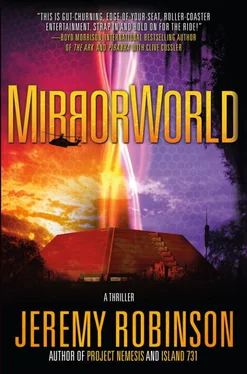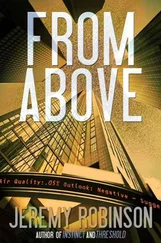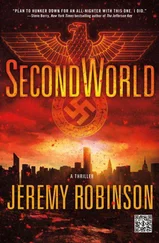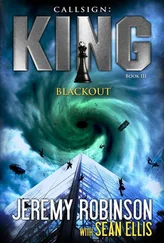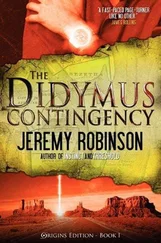She nods. “Your wife.”
I all but fall back into my seat. “Wife…”
“Part of you remembered her, too. You might not remember her, but you never stopped wanting to save her, did you?”
Despite my lack of memory, I know she’s right. “What’s her name?”
“Maya.”
“Maya,” I say, trying out the name, but it doesn’t sound familiar at all. Hell, my own name, Josef Shiloh, doesn’t feel right. To me, I’m still Crazy.
Or maybe that’s just the selfish man Allenby spoke of. My whole persona might be a fabrication. An escape. But from what? Running requires fear. What could I be afraid of?
The answer comes to me as a question.
“Who is Simon?”
Allenby looks freshly wounded by the question. This is where the story gets ugly. Where the pain begins. I can feel the invisible energy of it rolling off of her in waves. She lifts her head, twisting her mouth, and then speaks two words that radically alter the way I see the world.
“Your son.”
I stare at Allenby, searching for a hint of deception. I find none.
In the past year, I haven’t once considered that I might be married. The idea of having a son is so totally foreign to me. And yet I smile. “I have a son?”
Allenby does not smile.
Her gloom robs my smile as well.
“I had a son.”
Her nod is subtle.
“He’s dead?”
Another nod.
“How?”
“I’d rather not say.”
“I don’t remember it,” I assure her. “I don’t remember you, or Maya, or Simon. If you tell me, I’ll know about it, but I won’t feel it. To me, we’re talking about strangers.”
She blinks her tears away, looking at me with glossy brown eyes. “You feel nothing? Not even a little?”
I shake my head. It’s a lie.
I feel something . I’m not sure what. The emotions aren’t connected to a thought or memory. It’s deeper than that. But I can handle it, and I’m sure as hell not afraid to hear the rest, even if it was so bad that I had my memory eradicated.
“Fine,” she says, sitting back. She wipes her arm across her running nose and sniffs back her emotions. “It was Maya.”
“What was Maya?”
“She killed him. Your wife. Murdered your son.”
“How?”
“With a shard of glass from a broken clock. It was a gift, that clock, from me.” Allenby straightens her posture, steeling herself against the story. “She stabbed him fourteen times. In his arms. His chest. His stomach.”
Emotions roil. I fight against them.
“She held that little boy—he was eight—in her arms and buried the glass into him over and over, into the boy who trusted her implicitly, into the son she adored with every strand of her DNA, into the young man who you would have done anything to save.”
“But… why?”
“That’s harder to answer.” Allenby looks up at me and seems surprised.
“What?” I ask.
She points to the right side of my face. “Your cheek.”
I touch a finger to my cheek. It’s wet. A single tear has fallen. “Tell me why.”
“The official ruling was temporary insanity, which is actually close to the truth. Except there was nothing temporary about it. Over the months that followed, she descended into a kind of madness. She would scream until her throat went raw and she lost her voice. She would dig at her legs, exposing muscle.”
“I saw the scars.”
“She returns to herself on rare occasions, as she must have with you, but we’ve had to keep her heavily sedated. The marks you no doubt saw on her arms were self-inflicted wounds. Someone forgot to add a sedative to her IV bag. When she woke, she used her arms as a pin cushion for the IV needle. Even when she’s loopy on drugs, she finds ways to harm herself.”
“Is it the grief?” I ask. “Remorse for what she did?”
“No,” Allenby says. There’s not a trace of doubt in her voice. “It’s fear that drives her.”
“Fear?” From what I’ve observed over the past year, fear most often has a source. It could be as obvious as a man with a gun or as subtle as an idea. But what could Maya have to fear from an eight-year-old boy whom she adored? “Fear of what?”
“This is going to be hard to understand,” Allenby says.
“Because I don’t feel fear?”
“Because it’s bloody insane.”
“I lived in an asylum,” I remind her. “My life—the life that I remember—is about as insane as it gets.”
Allenby stands and takes the blender pitcher to the sink. Begins rinsing it out. “You’re wrong about that. That capital C you’re so fond of is going to feel a whole lot smaller in about sixty seconds.”
“What happens in sixty seconds?” I ask.
She points to the shade-covered kitchen window. “You’re going to build up the nerve to pull up that shade.”
“And what am I supposed to see?”
She pauses scrubbing the pitcher. “Do you remember injecting yourself?”
I hadn’t thought of it since waking, but I remember it. “Yes.”
“Do you remember the hallucinations?”
“Yeah, but—”
“What did you see?”
I think about the strange, distorted darkness, lined with green.
She doesn’t let me tell her. “What did you hear?”
I nearly say, “nothing,” but then I remember. “Whispers.”
She returns to her chore. “Then it worked.”
“What worked?”
“The drug you destroyed and then used on yourself. Bravo, by the way, hats off.” Her sarcasm is biting. “From the moment you woke up this morning, you were tested. No one knew things would go quite as far as they did—Maya and your dashing escape were not part of the plan—but the results, in the end, were predicted. All the while, your psychological and emotional states were being assessed, not to mention your physical abilities, which don’t seem to have deteriorated.”
“Whose horrible idea was that?” I ask. “I could have killed someone.”
“You nearly did, and I’m afraid Lyons organized the tests. I argued against it. Katzman, too. Though I think he was more concerned about himself.” She looks back at me. “They knew you’d do it, by the way. Inject yourself. All they had to do was convince you the contents were important. They just didn’t think you’d leave in a blaze of glory first.”
“Lyons didn’t have a heart attack, did he?”
She shakes her head. “He’s a decent actor. Knew you wouldn’t kill a man who was already dying.”
“They were shooting to kill.”
She nods. “There’s no other way to test a man who is as hard to kill as you. Lyons’s words. But his confidence in your abilities seems to have been well founded. Frankly, I’m surprised that you didn’t burn this place to the ground.”
“It was on my to-do list.”
“And now?”
“I’m not sure.”
“Then let’s make you sure.” She motions to the window. “Surreality awaits.”
I stand and step around the breakfast table. With a tug, the shade launches up, slapping against the window frame as the powerful spring turns it too many times.
The window is vertical, part of the story-tall steps running down two sides of the building. The view outside is what I remember. New Hampshire in summer. Green and blue. And…
Something else.
“What’s that?” I ask, pointing at the parking lot below. The lot is fairly empty now, and all signs of the previous day’s battle have been cleaned up.
Allenby steps up beside me. “What do you see?”
“Someone in the parking lot.” There’s a shadow moving among the cars, but I can’t make out who it is. “Is that a bear?”
Allenby shrugs. “I don’t see a thing.”
Читать дальше
